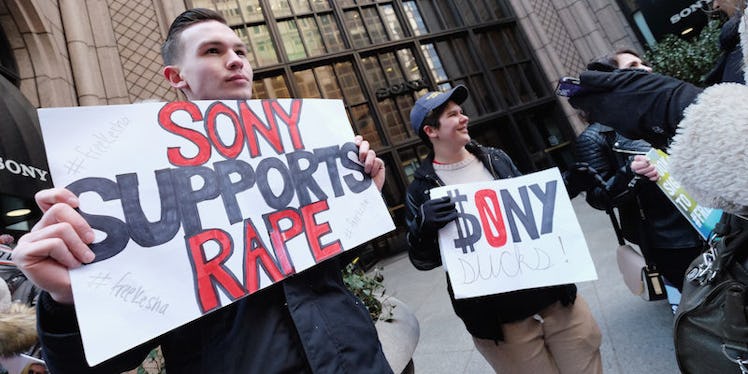
The Long And Pathetic History Of Misogyny In The Music Industry
For many of us, music is an inextricable part of our lives. It serves as the playlist for everything from gym workouts, breakups and road trips to crazy nights out on the town.
Some artists have an uncanny ability to express our feelings so well, it feels like they ripped pages from our diaries and sang them (only way better than we could, of course). We feel as though they get us, and we love them for that.
So, it's disturbing to realize the music industry has an insidious dark side, one that treats the women who work within it so badly. I first read about sexism in the music industry in 2015, when music editor Jessica Hopper asked women on Twitter to recount a time when they were made to feel second rate, whether as a journalist, artist or fan.
The cringe-worthy responses ranged from double standards to sexual harassment. But some were infinitely worse than others:
@jesshopp Was sexually assaulted on tour when I was TM. Told the band who said, 'I don't know what you were expecting, coming on the road.' — Cat Jones (@catjonessoda) August 27, 2015
Wow. And there is also this response from author Meaghan Garvey, who recounted in a series of tweets being sexually assaulted and then harassed by her assailant during a work trip to LA.
@jesshopp I went to sleep & wake up to the guy, who's told me I'm the 'best journalist,' ripping off my clothes. i try to push him off. — Fire Marshal Meaghan (@meaghan_garvey) August 26, 2015
@jesshopp I physically can't. when I wake up, I throw up for about 45 minutes. my rapist & 'patron' walks in whistling. literally. — Fire Marshal Meaghan (@meaghan_garvey) August 26, 2015
@jesshopp he says 'Do you remember last night? You threw yourself all over me.' I know it's a lie but there's nothing for me to say. — Fire Marshal Meaghan (@meaghan_garvey) August 26, 2015
Her story ends with her escaping on an $800 flight back home, crying the entire way.
"It's an open secret that the business is sexist," says Lizzy Goodman in her response to Hopper's Twitter project, titled "No More Secrets: Squashing Sexism in Music And Why This Is Just The Beginning." She writes,
It was as if an entire community of oppressed people had been holding their collective breath since the moment they were first violated, just waiting for someone to ask: are you being, brazenly, routinely abused? And the answer was a resounding yes.
Unfortunately, this industry doesn't seem to have made any progress since these female authors shone a light on its inherent sexism last year. Take what happened on Friday, when the Manhattan Supreme Court judge denied Kesha's request to be released from her contract with Sony after the singer suffered alleged sexual, physical and mental abuse at the hands of her producer, Dr. Luke.
In a cruel stroke of irony, the judge ruled Kesha must honor her contract to create six more albums in collaboration with the label of the man who hurt her. This has enormous and disheartening implications for female artists within the music industry and for the women everywhere who listen to their work.
Sony's stance, inexplicably upheld by the US justice system, says that a legally binding contract is more important than a woman's safety. It implies that if a corporation has invested $60 million in your career, as Sony has done for Kesha, it owns you and can treat you however it wants — however inhumanely — without having any legal repercussions.
It propagates the helplessness felt by victims everywhere, and that if you come forward and speak up against sexual assault, you will not be heard. Sony had a tremendous opportunity to send a message about the direction of the music industry and women's place in it. It had a chance to show that women's allegations of abuse would be addressed compassionately and seriously, as doing what was morally right would be put above doing what was profitable.
What a missed opportunity it turned out to be. Still, the outpouring of support from fellow stars Taylor Swift, Demi Lovato, Kelly Clarkson, Ariana Grande, Halsey and Lady Gaga offer a silver lining in an otherwise heartbreaking resolution to Kesha's legal saga.
With more and more women working in the music industry supporting each other, one day sexism in this field will be a thing of the past. But sadly, for now it seems it is here to stay.